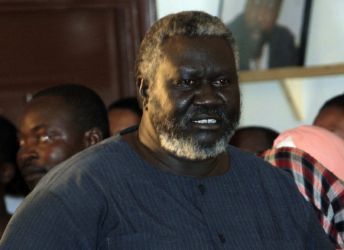SRF rebels deny agreement with Uma party to hold conference on peace in Sudan
August 12, 2012 (KHARTOUM) — Sudanese rebel alliance denied reaching an agreement with the opposition Uma National Party (UNP) to hold a national conference for peace in Sudan including all the political forces, stressing they welcome all the efforts aiming to bring down Khartoum regime.
 Mariam Al-Sadiq Al-Mahdi, UNP leading member was in Kampala from 27 July to 6 August to explain the position of its party which rejects military action to topple the regime and to persuade them to take part in a national conference for peace and democratic transition.
Mariam Al-Sadiq Al-Mahdi, UNP leading member was in Kampala from 27 July to 6 August to explain the position of its party which rejects military action to topple the regime and to persuade them to take part in a national conference for peace and democratic transition.
On Saturday in a press conference held in the Sudanese capital, she told reporters that the rebel groups welcomed the Uma party’s imitative. She also described the meetings held with the rebels as “promising and encouraging”.
Sudan Revolutionary Front (SRF) spokesperson, Abu Al-Gassim Imam Al-Haj, denied any having held any meeting or signing any agreement with Mariam. He said they encountered her during different public events organized in Kampala by the opposition groups.
“The change proposed in the UNP’s initiative leads to political reconciliation and co-existence with the regime leadership who are wanted by the (international) justice,” he said in statement to Sudan Tribune on Sunday.
“We believe that radical change is the best option of the Sudanese people because it paves the way to maintain Sudan’s unity, to achieve a just peace and to establish a democratic regime where there can be a political alternance between the democratic forces,” he emphasised.
Last Friday, the leader of the Uma party Sadiq Al-Mahdi once again warned rebel groups against resorting to military action to overthrow the regime. He said such violence would lead to civil war, brining more divisions and internationalises the Sudanese issue.
Instead, the main opposition party proposes to gather all the political forces, including the rebel groups in a national forum to discuss the crises of Darfur, South Kordofan, and Blue Nile, but also to agree on principles that should be included in the new national constitution.
Mariam Al-Mahdi stated on Saturday that the National Congress Party refused their initiative saying there is no political crisis requiring such solution. However, she added the ruling party reiterated its offer for bilateral dialogue with Uma party.
Last December, a delegation of the opposition Popular Congress Party of Hassan Al-Turabi led by Ibrahim Al-Sanusi was arrested at the Khartoum airport after their return from South Sudan where they met with the rebel groups.
Abu Al-Gassim said the SRF supports any political and military action aiming to topple the regime. He mentioned that they were the first since November 2011 to call on the opposition parties to discuss a political agreement and to coordinate ways to bring regime change in Sudan.
He also regretted Sadiq Al-Mahdi statements saying the military option is not their best choice but it is the regime to blame for resorting to violence.
The rebel spokesperson said they are ready to lay down their weapons and pursue their concerns through political channels when there is a democratic regime in the country allowing to realise their demands for peace, justice and development.
The SRF is founded in November 2011 by the Sudan People’s Liberation Movement – North (SPLM-N), Justice and Equality Movement, and two groups of the Sudan Liberation Movement led by Abdel Wahid Al-Nur and Minni Miinawi.
The four groups who are fighting the Sudanese government in South Kordofan and Blue Nile and Darfur carried out joint attacks against the army in South Kordofan, but did not materialise such operations in Darfur or Blue Nile yet.
However they vow in their founding charter to carry out an attrition war against the government forces across the country before to attack Khartoum to achieve a regime change.
The opposition forces in Khartoum, even if some of them support the military action to weaken the regime, prefer to take the power, as political forces, and involve the rebels in the constitutional process to reach a compromise over their regional demands.
Last June the opposition National Consensus Forces signed a joint political charter in Khartoum but did not consult the SRF forces. The move triggered the rejection of this text by the armed groups which termed the charter as “incomplete” and called to elaborate a joint document.
The international community on the other hand pushes the SPLM-N to negotiate a seperate agreement with the government keeping in mind that they will continue to cross the border to South Sudan and no peace can be achieved between the two countries without ending the South Kordofan and Blue Nile conflict.
(ST)
